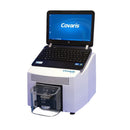Description
- Treatment Power: 75W PIP
- Sample Processing Capacity: Single tube processing
- NGS Sample Volumes: 15 to 130 µl
The M220 Focused-ultrasonicator offers the “Scientist’s Standard” in a compact, easy-to-use system making it the ideal DNA shearing solution for MiSeq and PGM users. AFA® technology in the M220 eliminates operator-induced variations, improves recoveries, increases efficiency, and provides standardized results.
Specifications :
| Technical Specification | Description |
|---|---|
| Primary Applications | Cell lysis: mammalian, bacterial, yeast, cfDNA Extraction from Plasma, DNA Extraction from Dried Blood Spots, DNA/RNA/Chromatin Shearing, DNA/RNA/Total NA/Protein Extraction from FFPE, Tissue lysis and extraction |
| Treatment Power | 75W PIP |
| Part Number | COV-500295 |
| Power Requirements | 100-240 VAC 500 VA, 50-60Hz |
| Operating Environment | Ambient temperature: 19 °C to 25 °C (66 °F to 77 °F) Relative humidity: 30% to 70% |
| Operating Temperature | Internal temperature control: Protocol temperature range from 7 °C to 20 °C |
| Safety | Complies with Low Voltage Directive 2006/95/EC. Certified to IEC/EN/UL 61010-1:2004 “Safety Requirements for Electrical Equipment for Measurement, Control, and Laboratory Use, Part1: General Requirements" |
| Regulatory Labeling | CE, ETL Mark (for Product Safety), WEEE |
| SonoLab Version | SonoLab 7 |
| Operating System | Windows 10 |
| WCS | NA |
| Chiller | Solid state chiller built-in |
| Sample Processing Capacity | Single tube processing |
| NGS Sample Volumes | 15 to 130 µl |
| Recommended Batch Size | NA |
| Covaris Consumables | microTUBE, microTUBE-50, milliTUBE 1 ml, miniTUBE |
| Upgrade Potential | No |
| Associated Accessories | M220 Accessories |
Key Features:
- Controlled energy delivery
- Isothermal processing
- Non-contact, closed vessel
- Quiet operation
- Robust and reliable design
- Tried and tested in major genome centers worldwide
Benefits:
- User-selectable fragment lengths
- No heat damage, high sample recovery
- No cross contamination, no aerosols, no clean up
- No discomfort to operators
- Reproducible results, year after year
- The mechanical shearing method of choice
Quick Guide:
DNA Shearing Protocols for Ion Torrent Platforms with the M220 Focused-ultrasonicator
Quick Guide: DNA Shearing with M220 Focused-ultrasonicator
TruSight Tumor 170 DNA Shearing Quick Guide
Manuals:
M220 Focused-ultrasonicator Setup & Instruction Manual
Posters:
Two New Solutions for Nucleic Acid Fragmentation
Four Minute Mycobacterium sp. Sample Preparation Process for MALDI-TOF Identification
Brochures:
Formulation and Drug Delivery Breakthrough processing for poorly soluble API’s
M-Series Focused-ultrasonicators
Application Notes:
AFA-based Efficient DNA Extraction and Optional Mechanical Shearing from Mycobacteria smegmatis
DNA Extraction from mycobacteria smegmatis. Learn More
AFA-based MALDI Biotyper Sample Preparation for Mycobacteria Colonies
AFA-based MALDI Learn More
Analysis of DNA fragments using the Agilent 2100 Bioanalyzer
DNA shearing protocols for Focused-ultrasonicators with the Agilent DNA 12000 kit was used to evaluate the average base pair size because of the large fragment... Learn More
DNA Shearing for Next Generation Sequencing (NGS) with the M220 Focused-ultrasonicator
DNA Shearing for NGS with the ME220 Focused-ultrasonicator. Learn More
Magnetic Bead-based Clean-up Using AFA-energetics®
When precisely tuned, this stream of Covaris Adaptive Focused Acoustic energy enables DNA shearing precisely and reliably to desired fragment sizes, in addition to gentle... Learn More
Protein Extraction from Yeast: Comparison of the Covaris Adaptive Focused Acoustics®(AFA) Process to Conventional Bead Beating and Probe Sonication
The efficiency of several mechanical-based lysis and extraction techniques, such as Adaptive Focused Acoustics (AFA), probe sonication, and bead beating from yeast isolates was compared.... Learn More
Simplifying ChIP from Primary Cells and Clinical Samples for High-throughput Epigenetic Applications
Large-scale analysis of histone marks and transcription factor interactions uses high-quality chromatin, use of validated ChIP-grade antibodies, and optimized reagents to produce meaningful results.... Learn More


